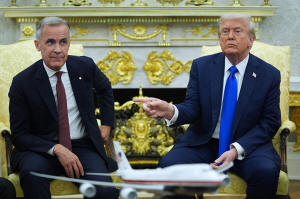Trump says Canadians will travel to the US again after a trade deal is
worked out
[October 08, 2025] By
ROB GILLIES
WASHINGTON (AP) — President Donald Trump predicted that Canadians will
travel to the United States once again after a trade deal is reached.
Trump told reporters in the Oval Office while meeting with Prime
Minister Mark Carney on Tuesday that he understands why many Canadians
are refusing to visit.
Trump’s talk of making Canada the 51st state to avoid tariffs has
infuriated Canadians, who are canceling trip s to the U.S. in big
numbers. There’s been a 23% drop in Canadian visits to the U.S. in the
first seven months of the year versus the same period in 2024, according
to Canada’s national statistical office.
“I understand that. Look, I understand that,” Trump said before
predicting Canada and the U.S. would ultimately reach a deal.
“It’s something that will get worked out. There’s still great love
between the two countries but you know American people want product
here, they want to make it here,” Trump said. “We are competing for the
same business. That’s the problem. That’s why I keep mentioning one way
to solve that problem. There’s a very easy way.”
Trump has often said that Canada could avoid tariffs by becoming the
51st state. The repeated jabs about the U.S. acquiring Canada have
alienated Canadian travelers.
“The people of Canada, they will love us again,” Trump said. “Most of
them still do. If you say only 25%. I assume a lot of them. I think they
love us.”

“It’s not bad. They’ll come back,” Carney told Trump.
Carney made his second visit to the Oval Office ahead of next year’s
review of the United States-Mexico-Canada Agreement and as one of the
world’s most durable and amicable alliances has been fractured by
Trump’s trade war and annexation threats.
Trump said he was open to extending the free trade agreement with Mexico
and Canada through a renegotiation or seeking “different deals.”
The free trade agreement was enacted during Trump’s first term, and it
allows the majority of Canadian and Mexican goods to be shipped to the
U.S. without tariffs. But Trump has made it clear since returning to
office that he wants to reshape the relationship, and he expressed
ambivalence over the process as long as he feels like he’s able to
improve America’s position.
“We could renegotiate it, and that would be good, or we can just do
different deals,” he said. “We’re allowed to do different deals if we
want. We might make deals that are better for the individual countries.”
Carney entered the visit hoping to find some relief on sector-specific
tariffs. Trump has some sector-specific tariffs on Canada, known as
Section 232 tariffs, that are having an impact. There are 50% tariffs on
steel and aluminum imports, for example.
[to top of second column] |

President Donald Trump and Canadian Prime Minister Mark Carney meet
in the Oval Office of the White House, Tuesday, Oct. 7, 2025, in
Washington. (AP Photo/Evan Vucci)
 After the meeting, Dominic LeBlanc,
the minister responsible for Canada-U.S. trade, described the talks
as “successful” and “positive” on trade issues, though he noted the
conversation would continue. He said Canada was looking to get a
deal done quickly on steel and aluminum.
There is fear in Canada over what will happen to the
U.S.-Mexico-Canada Agreement, which is critical to Canada’s economy.
More than three-quarters of Canada’s exports go to the U.S.
Trump showed a fondness for Carney — something he didn't have toward
Carney's predecessor, Justin Trudeau — but noted there was a
“natural conflict” between the two countries, a point to which the
prime minister politely disagreed.
“We want Canada to do great,” Trump said. “But you know, there’s a
point at which we also want the same business.”
Asked why the U.S. and Canada had failed to reach a deal on trade,
Trump said it’s a complicated situation.
“We have natural conflict,” he said. “We also have mutual love.”
Carney said he wouldn't use the word “conflict.”
“There are areas where we compete, and it’s in those areas where we
have to come to an agreement that works. But there are more areas
where we are stronger together, and that’s what we’re focused on.”
The U.S. president made a joking reference to a “merger” between the
two countries at the top of his remarks Tuesday.
Relations with Canada’s southern neighbor and longtime ally are at a
low point.
“We've had ups and downs, but this is the lowest point in relations
that I can recall,” said Frank McKenna, a former Canadian ambassador
to the United States.

“I talk every day to ordinary citizens who are changing their
vacation plans, and I talk to large business owners who are moving
reward trips away or executive business trips,” McKenna said. “There
is an outright rebellion.”
___
Associated Press writer Chris Megerian in Washington contributed to
this report.
All contents © copyright 2025 Associated Press. All rights reserved |